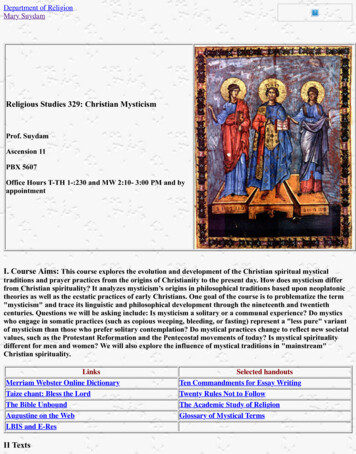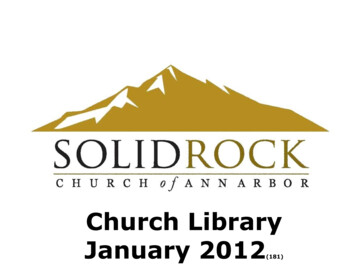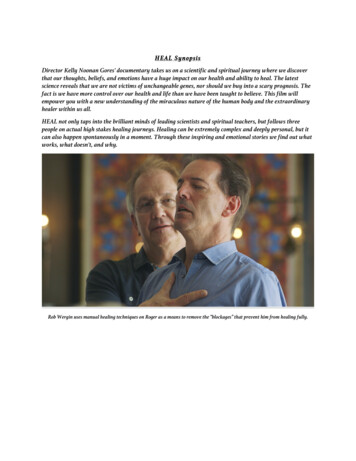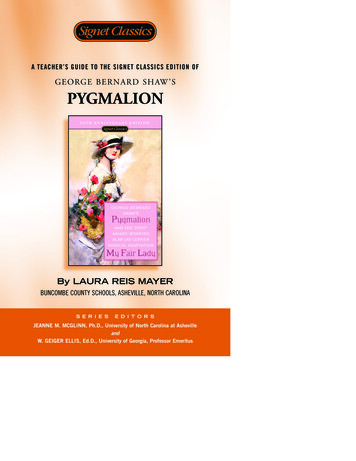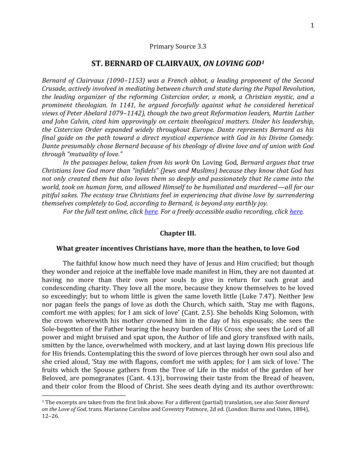
Transcription
1Primary Source 3.3ST. BERNARD OF CLAIRVAUX, ON LOVING GOD1Bernard of Clairvaux (1090–1153) was a French abbot, a leading proponent of the SecondCrusade, actively involved in mediating between church and state during the Papal Revolution,the leading organizer of the reforming Cistercian order, a monk, a Christian mystic, and aprominent theologian. In 1141, he argued forcefully against what he considered hereticalviews of Peter Abelard 1079–1142), though the two great Reformation leaders, Martin Lutherand John Calvin, cited him approvingly on certain theological matters. Under his leadership,the Cistercian Order expanded widely throughout Europe. Dante represents Bernard as hisfinal guide on the path toward a direct mystical experience with God in his Divine Comedy.Dante presumably chose Bernard because of his theology of divine love and of union with Godthrough “mutuality of love.”In the passages below, taken from his work On Loving God, Bernard argues that trueChristians love God more than “infidels” (Jews and Muslims) because they know that God hasnot only created them but also loves them so deeply and passionately that He came into theworld, took on human form, and allowed Himself to be humiliated and murdered—all for ourpitiful sakes. The ecstasy true Christians feel in experiencing that divine love by surrenderingthemselves completely to God, according to Bernard, is beyond any earthly joy.For the full text online, click here. For a freely accessible audio recording, click here.Chapter III.What greater incentives Christians have, more than the heathen, to love GodThe faithful know how much need they have of Jesus and Him crucified; but thoughthey wonder and rejoice at the ineffable love made manifest in Him, they are not daunted athaving no more than their own poor souls to give in return for such great andcondescending charity. They love all the more, because they know themselves to be lovedso exceedingly; but to whom little is given the same loveth little (Luke 7.47). Neither Jewnor pagan feels the pangs of love as doth the Church, which saith, ‘Stay me with flagons,comfort me with apples; for I am sick of love’ (Cant. 2.5). She beholds King Solomon, withthe crown wherewith his mother crowned him in the day of his espousals; she sees theSole-begotten of the Father bearing the heavy burden of His Cross; she sees the Lord of allpower and might bruised and spat upon, the Author of life and glory transfixed with nails,smitten by the lance, overwhelmed with mockery, and at last laying down His precious lifefor His friends. Contemplating this the sword of love pierces through her own soul also andshe cried aloud, ‘Stay me with flagons, comfort me with apples; for I am sick of love.’ Thefruits which the Spouse gathers from the Tree of Life in the midst of the garden of herBeloved, are pomegranates (Cant. 4.13), borrowing their taste from the Bread of heaven,and their color from the Blood of Christ. She sees death dying and its author overthrown:The excerpts are taken from the first link above. For a different (partial) translation, see also Saint Bernardon the Love of God, trans. Marianne Caroline and Coventry Patmore, 2d ed. (London: Burns and Oates, 1884),12–26.1
2she beholds captivity led captive from hell to earth, from earth to heaven, so ‘that at thename of Jesus every knee should bow, of things in heaven and things in earth and thingsunder the earth’ (Phil. 2.10). The earth under the ancient curse brought forth thorns andthistles; but now the Church beholds it laughing with flowers and restored by the grace of anew benediction. Mindful of the verse, ‘My heart danceth for joy, and in my song will Ipraise Him’, she refreshes herself with the fruits of His Passion which she gathers from theTree of the Cross, and with the flowers of His Resurrection whose fragrance invites thefrequent visits of her Spouse.Then it is that He exclaims, ‘Behold thou art fair, My beloved, yea pleasant: also ourbed is green’ (Cant. 1.16). She shows her desire for His coming and whence she hopes toobtain it; not because of her own merits but because of the flowers of that field which Godhath blessed. Christ who willed to be conceived and brought up in Nazareth, that is, thetown of branches, delights in such blossoms. Pleased by such heavenly fragrance thebridegroom rejoices to revisit the heart’s chamber when He finds it adorned with fruits anddecked with flowers—that is, meditating on the mystery of His Passion or on the glory ofHis Resurrection.The tokens of the Passion we recognize as the fruitage of the ages of the past,appearing in the fullness of time during the reign of sin and death (Gal. 4.4). But it is theglory of the Resurrection, in the new springtime of regenerating grace, that the freshflowers of the later age come forth, whose fruit shall be given without measure at thegeneral resurrection, when time shall be no more. And so it is written, ‘The winter is past,the rain is over and gone, the flowers appear on the earth’ (Cant. 2.11 f); signifying thatsummer has come back with Him who dissolves icy death into the spring of a new life andsays, ‘Behold, I make all things new’ (Rev. 21.5). His Body sown in the grave has blossomedin the Resurrection (I Cor. 15.42); and in like manner our valleys and fields which werebarren or frozen, as if dead, glow with reviving life and warmth.The Father of Christ who makes all things new, is well pleased with the freshness ofthose flowers and fruits, and the beauty of the field which breathes forth such heavenlyfragrance; and He says in benediction, ‘See, the smell of My Son is as the smell of a fieldwhich the Lord hath blessed’ (Gen. 27.27). Blessed to overflowing, indeed, since of Hisfullness have all we received (John 1.16). But the Bride may come when she pleases andgather flowers and fruits therewith to adorn the inmost recesses of her conscience; that theBridegroom when He cometh may find the chamber of her heart redolent with perfume.So it behoves us, if we would have Christ for a frequent guest, to fill our hearts withfaithful meditations on the mercy He showed in dying for us, and on His mighty power inrising again from the dead. To this David testified when he sang, ‘God spake once, and twiceI have also heard the same; that power belongeth unto God; and that Thou, Lord, artmerciful (Ps. 62.11f). And surely there is proof enough and to spare in that Christ died forour sins and rose again for our justification, and ascended into heaven that He mightprotect us from on high, and sent the Holy Spirit for our comfort. Hereafter He will comeagain for the consummation of our bliss. In His Death He displayed His mercy, in HisResurrection His power; both combine to manifest His glory.The Bride desires to be stayed with flagons and comforted with apples, because sheknows how easily the warmth of love can languish and grow cold; but such helps are onlyuntil she has entered into the bride chamber. There she will receive His long-desiredcaresses even as she sighs, ‘His left hand is under my head and His right hand doth embrace
3me’ (Cant. 2.6). Then she will perceive how far the embrace of the right hand excels allsweetness, and that the left hand with which He at first caressed her cannot be comparedto it. She will understand what she has heard: ‘It is the spirit that quickeneth; the fleshprofiteth nothing’ (John 6.63). She will prove what she hath read: ‘My memorial is sweeterthan honey, and mine inheritance than the honey-comb’ (Ecclus. 24.20). What is writtenelsewhere, ‘The memorial of Thine abundant kindness shall be showed’ (Ps. 145.7), refersdoubtless to those of whom the Psalmist had said just before: ‘One generation shall praiseThy works unto another and declare Thy power’ (Ps. 145.4). Among us on the earth there isHis memory; but in the Kingdom of heaven His very Presence. That Presence is the joy ofthose who have already attained to beatitude; the memory is the comfort of us who are stillwayfarers, journeying towards the Fatherland.Chapter IV.Of those who find comfort in the recollection of God, or are fittest for His loveBut it will be well to note what class of people takes comfort in the thought of God.Surely not that perverse and crooked generation to whom it was said, ‘Woe unto you thatare rich; for ye have received your consolation’ (Luke 6.24). Rather, those who can say withtruth, ‘My soul refuseth comfort’ (Ps. 77.2). For it is meet that those who are not satisfied bythe present should be sustained by the thought of the future, and that the contemplation ofeternal happiness should solace those who scorn to drink from the river of transitory joys.That is the generation of them that seek the Lord, even of them that seek, not their own, butthe face of the God of Jacob. To them that long for the presence of the living God, thethought of Him is sweetest itself: but there is no satiety, rather an ever-increasing appetite,even as the Scripture bears witness, ‘they that eat me shall yet be hungry’ (Ecclus. 24.21);and if the one an-hungred spake, ‘When I awake up after Thy likeness, I shall be satisfiedwith it.’ Yea, blessed even now are they which do hunger and thirst after righteousness, forthey, and they only, shall be filled. Woe to you, wicked and perverse generation; woe to you,foolish and abandoned people, who hate Christ’s memory, and dread His second Advent!Well may you fear, who will not now seek deliverance from the snare of the hunter;because ‘they that will be rich fall into temptation and a snare, and into many foolish andhurtful lusts’ (I Tim. 6.9). In that day we shall not escape the dreadful sentence ofcondemnation, ‘Depart from Me, ye cursed, into everlasting fire’ (Matt. 25.41). O dreadfulsentence indeed, O hard saying! How much harder to bear than that other saying which werepeat daily in church, in memory of the Passion: ‘Whoso eateth My flesh and drinketh Myblood hath eternal life’ (John 6.54). That signifies, whoso honors My death and after Myexample mortifies his members which are upon the earth (Col. 3.5) shall have eternal life,even as the apostle says, ‘If we suffer, we shall also reign with Him’ (II Tim. 2.12). And yetmany even today recoil from these words and go away, saying by their action if not withtheir lips, ‘This is a hard saying; who can hear it?’ (John 6.60). ‘A generation that set nottheir heart aright, and whose spirit cleaveth not steadfastly unto God’ (Ps. 78.8), butchooseth rather to trust in uncertain riches, it is disturbed at the very name of the Cross,and counts the memory of the Passion intolerable. How can such sustain the burden of thatfearful sentence, ‘Depart from Me, ye cursed, into everlasting fire, prepared for the deviland his angels’? ‘On whomsoever that stone shall fall it will grind him to powder’ (Luke20.18); but ‘the generation of the faithful shall be blessed’ (Ps. 112.2), since, like the apostle,
4they labor that whether present or absent they may be accepted of the Lord (II Cor. 5.9). Atthe last day they too shall hear the Judge pronounce their award, ‘Come, ye blessed of MyFather, inherit the kingdom prepared for you from the foundation of the world’ (Matt.25.34).In that day those who set not their hearts aright will feel, too late, how easy isChrist’s yoke, to which they would not bend their necks and how light His burden, incomparison with the pains they must then endure. O wretched slaves of Mammon, youcannot glory in the Cross of our Lord Jesus Christ while you trust in treasures laid up onearth: you cannot taste and see how gracious the Lord is, while you are hungering for gold.If you have not rejoiced at the thought of His coming, that day will be indeed a day of wrathto you.But the believing soul longs and faints for God; she rests sweetly in thecontemplation of Him. She glories in the reproach of the Cross, until the glory of His faceshall be revealed. Like the Bride, the dove of Christ, that is covered with silver wings (Ps.68.13), white with innocence and purity, she reposes in the thought of Thine abundantkindness, Lord Jesus; and above all she longs for that day when in the joyful splendor ofThy saints, gleaming with the radiance of the Beatific Vision, her feathers shall be like gold,resplendent with the joy of Thy countenance.Rightly then may she exult, ‘His left hand is under my head and His right hand dothembrace me.’ The left hand signifies the memory of that matchless love, which moved Himto lay down His life for His friends; and the right hand is the Beatific Vision which He hathpromised to His own, and the delight they have in His presence. The Psalmist singsrapturously, ‘At Thy right hand there is pleasure for evermore’ (Ps. 16.11): so we arewarranted in explaining the right hand as that divine and deifying joy of His presence.Rightly too is that wondrous and ever-memorable love symbolized as His left hand,upon which the Bride rests her head until iniquity be done away: for He sustains thepurpose of her mind, lest it should be turned aside to earthly, carnal desires. For the fleshwars against the spirit: ‘The corruptible body presseth down the soul, and the earthlytabernacle weigheth down the mind that museth upon many things’ (Wisdom 9.15). Whatcould result from the contemplation of compassion so marvelous and so undeserved, favorso free and so well attested, kindness so unexpected, clemency so unconquerable, grace soamazing except that the soul should withdraw from all sinful affections, reject all that isinconsistent with God’s love, and yield herself wholly to heavenly things? No wonder is itthat the Bride, moved by the perfume of these unctions, runs swiftly, all on fire with love,yet reckons herself as loving all too little in return for the Bridegroom’s love. And rightly,since it is no great matter that a little dust should be all consumed with love of that Majestywhich loved her first and which revealed itself as wholly bent on saving her. For ‘God soloved the world that He gave His only-begotten Son, that whosoever believeth in Himshould not perish but have everlasting life’ (John 3.16). This sets forth the Father’s love. But‘He hath poured out His soul unto death,’ was written of the Son (Isa. 53.12). And of theHoly Spirit it is said, ‘The Comforter which is the Holy Ghost whom the Father will send inMy name, He shall teach you all things, and bring all things to your remembrance,whatsoever I have said unto you’ (John 14.26). It is plain, therefore, that God loves us, andloves us with all His heart; for the Holy Trinity altogether loves us, if we may venture so tospeak of the infinite and incomprehensible Godhead who is essentially one.
5Chapter V.Of the Christian’s debt of love, how great it isFrom the contemplation of what has been said, we see plainly that God is to be loved,and that He has a just claim upon our love. But the infidel does not acknowledge the Son ofGod, and so he can know neither the Father nor the Holy Spirit; for he that honoureth notthe Son, honoureth not the Father which sent Him, nor the Spirit whom He hath sent (John5.23). He knows less of God than we; no wonder that he loves God less. This much heunderstands at least—that he owes all he is to his Creator. But how will it be with me? For Iknow that my God is not merely the bounteous Bestower of my life, the generous Providerfor all my needs, the pitiful Consoler of all my sorrows, the wise Guide of my course: butthat He is far more than all that. He saves me with an abundant deliverance: He is myeternal Preserver, the portion of my inheritance, my glory. Even so it is written, ‘With Himis plenteous redemption’ (Ps. 130.7); and again, ‘He entered in once into the holy place,having obtained eternal redemption for us’ (Heb. 9.12). Of His salvation it is written, ‘Heforsaketh not His that be godly; but they are preserved for ever’ (Ps. 37.28); and of Hisbounty, ‘Good measure, pressed down and shaken together, and running over, shall mengive into your bosom’ (Luke 6.38); and in another place, ‘Eye hath not seen nor ear heard,neither have entered into the heart of man, those things which God hath prepared for themthat love Him’ (I Cor. 2.9). He will glorify us, even as the apostle beareth witness, saying,‘We look for the Savior, the Lord Jesus Christ, who shall change our vile body that it may befashioned like unto His glorious body’ (Phil. 3.20f); and again, ‘I reckon that the sufferingsof this present time are not worthy to be compared with the glory which shall be revealedin us’ (Rom. 8.18); and once more, ‘Our light affliction, which is but for a moment, workethfor us a far more exceeding and eternal weight of glory; while we look not at the thingswhich are seen, but at the things which are not seen (II Cor. 4.17f).’What shall I render unto the Lord for all His benefits towards me?’ (Ps. 116.12).Reason and natural justice alike move me to give up myself wholly to loving Him to whom Iowe all that I have and am. But faith shows me that I should love Him far more than I lovemyself, as I come to realize that He hath given me not my own life only, but even Himself.Yet, before the time of full revelation had come, before the Word was made flesh, died onthe Cross, came forth from the grave, and returned to His Father; before God had shown ushow much He loved us by all this plenitude of grace, the commandment had been uttered,‘Thou shalt love the Lord thy God with all thine heart, and with all thy soul and with all thymight’ (Deut. 6.5), that is, with all thy being, all thy knowledge, all thy powers. And it wasnot unjust for God to claim this from His own work and gifts. Why should not the creaturelove his Creator, who gave him the power to love? Why should he not love Him with all hisbeing, since it is by His gift alone that he can do anything that is good? It was God’s creativegrace that out of nothingness raised us to the dignity of manhood; and from this appearsour duty to love Him, and the justice of His claim to that love. But how infinitely is thebenefit increased when we bethink ourselves of His fulfillment of the promise, ‘thou, Lord,shalt save both man and beast: how excellent is Thy mercy, O Lord! ’ (Ps. 36.6f.). For we,who ‘turned our glory into the similitude of a calf that eateth hay’ (Ps. 106.20), by our evildeeds debased ourselves so that we might be compared unto the beasts that perish. I oweall that I am to Him who made me: but how can I pay my debt to Him who redeemed me,
6and in such wondrous wise? Creation was not so vast a work as redemption; for it iswritten of man and of all things that were made, ‘He spake the word, and they were made’(Ps. 148.5). But to redeem that creation which sprang into being at His word, how much Hespake, what wonders He wrought, what hardships He endured, what shames He suffered!Therefore what reward shall I give unto the Lord for all the benefits which He hath doneunto me? In the first creation He gave me myself; but in His new creation He gave meHimself, and by that gift restored to me the self that I had lost. Created first and thenrestored, I owe Him myself twice over in return for myself. But what have I to offer Him forthe gift of Himself? Could I multiply myself a thousand-fold and then give Him all, whatwould that be in comparison with God?.
bridegroom rejoices to revisit the heart's chamber when He finds it adorned with fruits and . when time shall be no more. And so it is written, 'The winter is past, the rain is over and gone, the flowers appear on the earth' (Cant. 2.11 f); signifying that . in memory of the Passion: 'Whoso eateth My flesh and drinketh My blood hath .
